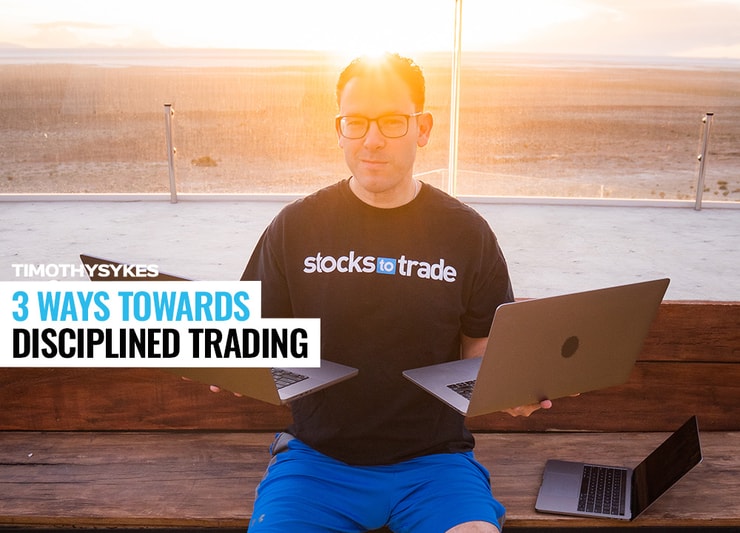Make no mistake about it…
You need to know a few setups that work.
100k milestone: I wouldn’t be enjoying 2023 without going through the trials of 2022, shoutout to @timothysykes and @Jackaroo_Trades for all their help, I’ve been lucky enough to learn from so many amazing traders in the Sykes challenge, can’t wait to see what’s next pic.twitter.com/CIH8UR9e5x
— Strati (@Stratataaa) June 22, 2023
I teach several, like the Weekend Trade and how I trade Supernovas.
If you dedicate yourself to studying the patterns, I don’t think they’re that hard to learn.
In fact, learning the strategies is probably one of the easiest things to do if you have a good mentor.
What trips folks up…and what really stops them from achieving what my top students have…is the mental game of trading.
Specifically, discipline.
Or should I say the lack of discipline?
Very few things are as frustrating as having a series of winning trades and strong results get wiped out by one careless decision.
To all you #DiamondHands dumbasses, I don't care how much $ you've made on any pump or play in the past, you keep ignoring trading rules you WILL blow up & lose everything eventually. Rules/discipline matter, bubbles & manias are fun for growing fast wealth & teaching bad lessons
— Timothy Sykes (@timothysykes) May 19, 2021
If you’re constantly giving up days, weeks, or even months’ worth of gains from bad trade selection or poor risk management, then today’s message is for you.
Because I’m about to share with you the 3 ways I’ve managed to stay disciplined for over two decades… while racking up $7.4 million in trading profits and mentoring over 30 millionaire students.
Table of Contents
No. #1 Embrace Fear

I am not one of those mentors who will tell you to block out fear and trade emotionless.
If you have no emotions, you’re likely dead, a psycho, or a short-seller.
For me, fear allows me to respect the market.
It helps me stay sharp and on my toes.
Most stocks I trade are crappy companies that won’t amount to anything. They’re also super volatile and can free-fall or skyrocket in a matter of seconds.
That’s why I need to be hyper-alert.
If I’m not, I’m vulnerable to big losses just like anyone else.
That’s why I embrace fear.
And it’s how fear helps me craft my number one rule for trading:
CUT LOSSES QUICKLY
You see, I’ve made it part of my identity.
As long as I can keep my losses small…I’ll be able to work through whatever issues I have and eventually come out on top.
If you want to become more disciplined in your trading, you must develop strict risk management rules.
Mine is Cut Losses Quickly.
No. #2 Thorough Trade Planning

Before I enter a trade, I’m surveying the landscape.
I’m the type of trader who might see a stock for the first time, watch it for a few days, and then trade it afterward.
I do my best trading when I’m patient.
How can you improve your patience?
I think the best way to do it is to outline your best setups.
For example, I may like a specific catalyst but not like the price action in the stock.
Or I might like the catalyst, but I feel like I missed the initial move-up, so I’d only play if the stock dips back down.
So there are specific setups I’m looking for and then potential moves I’m playing for.
For example, I may buy stock off a panic dip buy to capture a quick 15-20% move.
But what happens if I get in and the stock doesn’t move?
If the play doesn’t work for me…I’m out.
I’m not always waiting for the position to go red on me.
You see if there’s a move I’m playing for and it’s not happening…I’m probably getting out fairly quickly.
While I do miss out on some monster moves…my tight rules keep me out of trouble for the most part.
I believe you can grow your account substantially if you stack small wins and manage risk properly.
That’s what I teach my students.
More Breaking News
- Huntington Bancshares Faces Earnings Miss, Market Considers Impacts
- Huntington Bancshares Misses Q4 Earnings Estimate Amid Turbulent Market Conditions
- Jumia Faces Market Headwinds Amid Rising Costs and Strategic Challenges
- Datadog Soars with Strategic Price Adjustments Amid Optimism
No. #3 On-Going Self-Evaluation

Unlike your favorite social-media trader, I prefer to post my trades…ALL OF THEM.
When I win, you see it…
When I get my butt kicked…you see it.
But I’ve been under the microscope since my 20s.
There are tons of people who want to see me fail…but I know I will be hard to beat if I study, evaluate, and review my trades.
If I’m telling you to do these things and I’m not doing them…what kind of a mentor am I?
A lot of the time, I’ll even make video reviews breaking down my trades and explaining what I did right and wrong.
If I’m overtrading or being sloppy with my risk, it will come out when I do my reviews.
If I’m making money with a particular strategy, the review will reinforce what’s working.
Final Note
Discipline in trading, just like in life, isn’t easy.
However, I’ve discovered that you can succeed better if you follow the rules like the three I shared with you today.
They are essential for your long-term success.
If you need help being accountable… you should check out what my program offers. For some, it has been life-changing.


Leave a reply